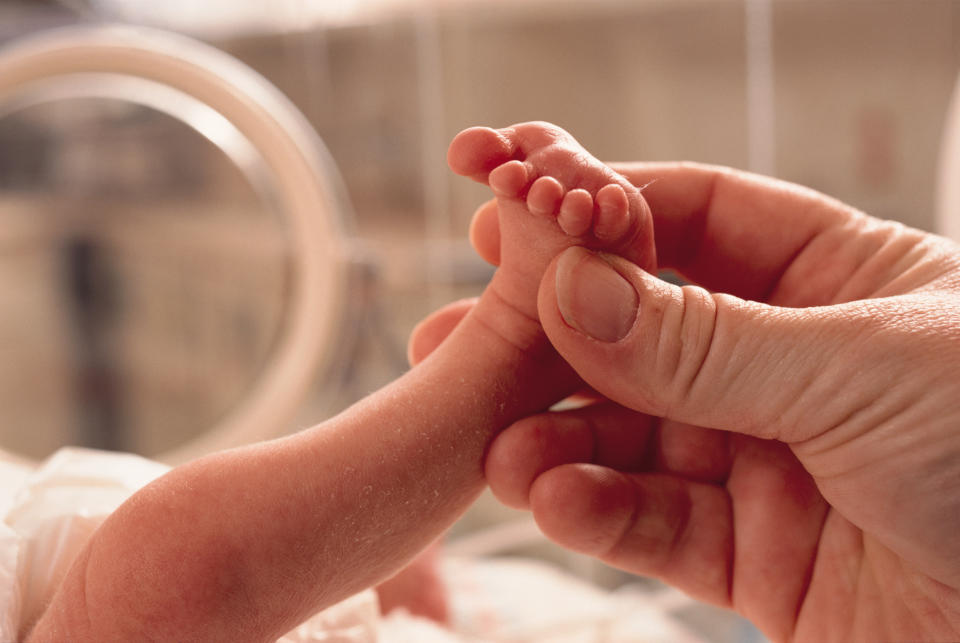Boris Johnson and Carrie Symonds appear to welcome baby boy early – what are premature birth risks?

Boris Johnson’s fiancée Carrie Symonds has given birth to a “healthy baby boy”.
The pair announced in March that Symonds was due in “early summer”, a season that begins on 20 June in the UK.
Since the unnamed newborn arrived on 29 April, Symonds is said to have gone into labour at least seven weeks early.
There has been no confirmation the couple’s child did arrive significantly ahead of his due date. Their spokesperson said both the mother, 32, and baby are “doing very well”.

The new arrival comes just weeks after the prime minister, 55, was admitted to intensive care with the coronavirus.
Symonds also developed the tell-tale fever and cough, but is not thought to have been tested.
Being infected with the coronavirus is not thought to bring on premature labour, although the details are unclear.
“Acute illnesses which cause fever can be associated with premature labour and birth,” said Professor Marian Knight from the University of Oxford.
“However, most premature births in association with COVID-19 [the respiratory disease caused by the coronavirus] in published reports from China and elsewhere have been due to early Caesarean births in women with acute illness who are having COVID-related breathing difficulties or whose babies are in distress, rather than because of premature labour.
“These early births have been reported in women who are acutely ill with COVID-19 rather than women who have had COVID-19 symptoms but then recovered.”
What is considered a premature birth?
The average pregnancy lasts around 40 weeks.
This is calculated from the first day of the woman’s last period, not the date of conception.
A premature labour is one that occurs before week 37, which affects around two in every 25 babies in the UK.
Babies born at 24 weeks are considered “viable”, meaning it is possible they will survive.
Existing guidance states medics should not attempt to save a baby born before 23 weeks due to it supposedly not being in the child’s best interest.
Health officials have campaigned, however, for the “cut-off” to be reduced to 22 weeks.
The British Association of Perinatal Medicine has pointed out that the guidelines were put together in 2008, and survival rates among these newborns has since doubled from one in five to two in five.
The improved survival rates among babies born at 22 weeks has been put down to technological advances that enable better ventilation for the newborns’ underdeveloped lungs, as well as measures that reduce the risk of infection.
Babies born before 22 weeks are not expected to survive due to their lungs being underdeveloped, leaving them unable to get oxygen into their blood.
For infants delivered later in the term, steroids help to stimulate lung development.
What causes babies to be born premature?
The exact cause of why a baby is born premature is not always clear.
Pregnant women are known to be more at risk if they have given birth too soon before or are having multiple babies, like twins.
A gap of less than six months between pregnancies or conceiving via IVF are also recognised risk factors.
Some women may have problems with their uterus, cervix or placenta that lead to an early delivery.
Infections of the amniotic fluid or lower genital tract can also trigger an early birth.
Chronic conditions like high blood pressure or diabetes may also be to blame, as can smoking or taking illicit drugs.
Multiple miscarriages or abortions, as well as injuries and trauma, have also been linked to a premature birth.
Being under or overweight before pregnancy is another risk factor, as is enduring a stressful life event, such as a bereavement.
Symonds described experiencing a suspected coronavirus infection while pregnant as “obviously worrying”.
Signs of a premature delivery include regular contractions, period-type pain, waters breaking, unusual back discomfort and a “show” – when the plug of mucus that sealed the cervix during pregnancy comes out the vagina.

What after-care is given to premature babies and their mother?
Babies born at 24 weeks require care in a specialist neonatal unit.
Pregnant woman who are likely to have a baby prematurely should be admitted to a hospital with this facility.
Staff can help a premature newborn feed, breathe and keep warm.
The baby may be put in an incubator to keep warm or on a breathing machine. Parents may still be able to wash their child and change its nappy. They can also hold their baby once it is stable.
If a baby is too small or unwell to feed itself, milk can be passed through a tube in their nose or mouth into their stomach. This is painless for the child.
What are the risks of being born premature?
An infant’s hope of survival increases with every week in the womb, however, many delivered too soon are left with serious disabilities.
Missing out on development in the uterus may leave a premature baby with health issues, like being more vulnerable to infections or neurological disorders.
Jaundice, which makes the skin and whites of the eyes yellow, is common in premature newborns due to their liver being underdeveloped.
Babies with severe jaundice may be treated with light therapy to break down the chemical that causes the discolouration. In very rare cases, a blood transfusion is required.
The infant will be tested to ensure the jaundice is not a symptom of liver disease.
Breathing difficulties are fairly common in premature newborns.
If the baby's lungs lack surfactant, the substance that allows the lungs to expand, they may develop respiratory distress syndrome.
This occurs when the lungs cannot supply enough oxygen for the rest of the body and requires ventilation.
The most common heart problems premature babies face are patent ductus arteriosus (PDA) and low blood pressure.
PDA is defined as a persistent opening between the aorta – the “main artery”, and the pulmonary artery – which carries blood from the heart to the lungs.
This often closes on its own, but can lead to a heart murmur or failure.
Low blood pressure can often be relieved via intravenous fluids, drugs and sometimes a blood transfusion.
Premature babies are also at risk of bleeding in the brain.
Most haemorrhages are mild and do not cause long-term issues; however, larger bleeds can lead to permanent brain injury.
Necrotising enterocolitis, when the cells lining the bowel are injured, can occur when premature newborns start feeding. This is less common in those exclusively given breast milk.
In the long term, premature babies can endure cerebral palsy and impaired learning.
They are also more at risk of vision, hearing, dental and psychological problems.



